
List of Nobel Peace Prize laureates
Encyclopedia
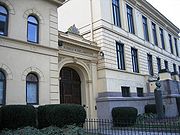
Nobel Peace Prize
The Nobel Peace Prize is one of the five Nobel Prizes bequeathed by the Swedish industrialist and inventor Alfred Nobel.-Background:According to Nobel's will, the Peace Prize shall be awarded to the person who...
(Norwegian
Norwegian language
Norwegian is a North Germanic language spoken primarily in Norway, where it is the official language. Together with Swedish and Danish, Norwegian forms a continuum of more or less mutually intelligible local and regional variants .These Scandinavian languages together with the Faroese language...
and ) is awarded annually by the Norwegian Nobel Committee
Norwegian Nobel Committee
The Norwegian Nobel Committee awards the Nobel Peace Prize each year.Its five members are appointed by the Norwegian Parliament and roughly represent the political makeup of that body.-History:...
"to the person who shall have done the most or the best work for fraternity between nations, for the abolition or reduction of standing armies and for the holding and promotion of peace congresses." It is one of the five Nobel Prize
Nobel Prize
The Nobel Prizes are annual international awards bestowed by Scandinavian committees in recognition of cultural and scientific advances. The will of the Swedish chemist Alfred Nobel, the inventor of dynamite, established the prizes in 1895...
s established by the 1895 will
Will (law)
A will or testament is a legal declaration by which a person, the testator, names one or more persons to manage his/her estate and provides for the transfer of his/her property at death...
of Alfred Nobel
Alfred Nobel
Alfred Bernhard Nobel was a Swedish chemist, engineer, innovator, and armaments manufacturer. He is the inventor of dynamite. Nobel also owned Bofors, which he had redirected from its previous role as primarily an iron and steel producer to a major manufacturer of cannon and other armaments...
(who died in 1896), awarded for outstanding contributions in chemistry
Nobel Prize in Chemistry
The Nobel Prize in Chemistry is awarded annually by the Royal Swedish Academy of Sciences to scientists in the various fields of chemistry. It is one of the five Nobel Prizes established by the will of Alfred Nobel in 1895, awarded for outstanding contributions in chemistry, physics, literature,...
, physics
Nobel Prize in Physics
The Nobel Prize in Physics is awarded once a year by the Royal Swedish Academy of Sciences. It is one of the five Nobel Prizes established by the will of Alfred Nobel in 1895 and awarded since 1901; the others are the Nobel Prize in Chemistry, Nobel Prize in Literature, Nobel Peace Prize, and...
, literature
Nobel Prize in Literature
Since 1901, the Nobel Prize in Literature has been awarded annually to an author from any country who has, in the words from the will of Alfred Nobel, produced "in the field of literature the most outstanding work in an ideal direction"...
, peace, and physiology or medicine
Nobel Prize in Physiology or Medicine
The Nobel Prize in Physiology or Medicine administered by the Nobel Foundation, is awarded once a year for outstanding discoveries in the field of life science and medicine. It is one of five Nobel Prizes established in 1895 by Swedish chemist Alfred Nobel, the inventor of dynamite, in his will...
. As dictated by Nobel's will, the award is administered by the Norwegian Nobel Committee
Norwegian Nobel Committee
The Norwegian Nobel Committee awards the Nobel Peace Prize each year.Its five members are appointed by the Norwegian Parliament and roughly represent the political makeup of that body.-History:...
and awarded by a committee of five people elected by the Parliament of Norway. The first Nobel Peace Prize was awarded in 1901 to Frédéric Passy
Frédéric Passy
Frédéric Passy was a French economist and a joint winner of the first Nobel Peace Prize awarded in 1901.- Biography :...
and Henry Dunant
Henry Dunant
Jean Henri Dunant , aka Henry Dunant, was a Swiss businessman and social activist. During a business trip in 1859, he was witness to the aftermath of the Battle of Solferino in modern day Italy...
. Each recipient receives a medal, a diploma, and a monetary award prize that has varied throughout the years. In 1901, Passy and Dunant shared a Prize of 150,782 Swedish kronor
Swedish krona
The krona has been the currency of Sweden since 1873. Both the ISO code "SEK" and currency sign "kr" are in common use; the former precedes or follows the value, the latter usually follows it, but especially in the past, it sometimes preceded the value...
, which was equal to 7,731,004 kronor in 2008. In 2008, the Prize was awarded to Martti Ahtisaari
Martti Ahtisaari
Martti Oiva Kalevi Ahtisaari is a Finnish politician, the tenth President of Finland , Nobel Peace Prize laureate and United Nations diplomat and mediator, noted for his international peace work....
of Finland, who received the Prize amount of 10,000,000 kronor (slightly more than €
Euro
The euro is the official currency of the eurozone: 17 of the 27 member states of the European Union. It is also the currency used by the Institutions of the European Union. The eurozone consists of Austria, Belgium, Cyprus, Estonia, Finland, France, Germany, Greece, Ireland, Italy, Luxembourg,...
1 million, or US$
United States dollar
The United States dollar , also referred to as the American dollar, is the official currency of the United States of America. It is divided into 100 smaller units called cents or pennies....
1.4 million). The Peace Prize is presented annually in Oslo
Oslo
Oslo is a municipality, as well as the capital and most populous city in Norway. As a municipality , it was established on 1 January 1838. Founded around 1048 by King Harald III of Norway, the city was largely destroyed by fire in 1624. The city was moved under the reign of Denmark–Norway's King...
, in the presence of the King of Norway, on December 10, the anniversary of Nobel's death, and is the only Nobel Prize not presented in Stockholm
Stockholm
Stockholm is the capital and the largest city of Sweden and constitutes the most populated urban area in Scandinavia. Stockholm is the most populous city in Sweden, with a population of 851,155 in the municipality , 1.37 million in the urban area , and around 2.1 million in the metropolitan area...
.
The prize is considered the most controversial of the Nobel Prizes with several of the selections having been criticised. Despite having been nominated five times, Mohandas Karamchand Gandhi never won the Prize. Following his assassination in 1948, the committee considered awarding it to him posthumously but decided against it and instead withheld the Prize that year with the explanation that "there was no suitable living candidate." In 1961, Dag Hammarskjöld
Dag Hammarskjöld
Dag Hjalmar Agne Carl Hammarskjöld was a Swedish diplomat, economist, and author. An early Secretary-General of the United Nations, he served from April 1953 until his death in a plane crash in September 1961. He is the only person to have been awarded a posthumous Nobel Peace Prize. Hammarskjöld...
, who died after his nomination but several months before the announcement, became the only Laureate to be recognised posthumously; following this, the statutes were changed to make a future posthumous prize nearly impossible. In 1973, Le Duc Tho
Le Duc Tho
Lê Đức Thọ , born Phan Đình Khải in Ha Nam province, was a Vietnamese revolutionary, general, diplomat, and politician, who was awarded the Nobel Peace Prize jointly with United States Secretary of State Henry Kissinger in 1973, although he declined it....
declined the Prize, because "he was not in a position to accept the Prize, citing the situation in Vietnam as his reason." Linus Pauling
Linus Pauling
Linus Carl Pauling was an American chemist, biochemist, peace activist, author, and educator. He was one of the most influential chemists in history and ranks among the most important scientists of the 20th century...
, the Nobel Peace Prize laureate in 1962, is the only person to have been awarded two unshared Nobel Prizes; he won the Nobel Prize in Chemistry in 1954.
Laureates
As of 2011, the Peace Prize has been awarded to 101 individuals and 20 organizations. Fifteen women have won the Nobel Peace Prize, more than any other Nobel Prize. Only two recipients have won multiple Prizes: the International Committee of the Red CrossInternational Committee of the Red Cross
The International Committee of the Red Cross is a private humanitarian institution based in Geneva, Switzerland. States parties to the four Geneva Conventions of 1949 and their Additional Protocols of 1977 and 2005, have given the ICRC a mandate to protect the victims of international and...
has won three times (1917, 1944, and 1963) and the United Nations High Commissioner for Refugees
United Nations High Commissioner for Refugees
The Office of the United Nations High Commissioner for Refugees , also known as The UN Refugee Agency is a United Nations agency mandated to protect and support refugees at the request of a government or the UN itself and assists in their voluntary repatriation, local integration or resettlement to...
has won twice (1954 and 1981). There have been 19 years since its creation in which the Peace Prize was not awarded, more times than any other Nobel Prize.
| Year | Laureate | Country | Rationale | |
|---|---|---|---|---|
| 1901 |  |
Henry Dunant Henry Dunant Jean Henri Dunant , aka Henry Dunant, was a Swiss businessman and social activist. During a business trip in 1859, he was witness to the aftermath of the Battle of Solferino in modern day Italy... |
Switzerland | For his role in founding the International Committee of the Red Cross International Committee of the Red Cross The International Committee of the Red Cross is a private humanitarian institution based in Geneva, Switzerland. States parties to the four Geneva Conventions of 1949 and their Additional Protocols of 1977 and 2005, have given the ICRC a mandate to protect the victims of international and... |
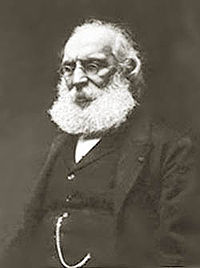 |
Frédéric Passy Frédéric Passy Frédéric Passy was a French economist and a joint winner of the first Nobel Peace Prize awarded in 1901.- Biography :... |
France | "[For] being one of the main founders of the Inter-Parliamentary Union and also the main organizer of the first Universal Peace Congress Peace congress A peace congress, in international relations, has at times been defined in a way that would distinguish it from a peace conference , as an ambitious forum to carry out dispute resolution in international affairs, and prevent wars... " |
|
| 1902 |  |
Élie Ducommun Élie Ducommun Élie Ducommun was a peace activist. He is a winner of the 1902 Nobel Peace Prize, which he shared with Charles Albert Gobat.... |
Switzerland | "[For his role as] the first honorary secretary of the International Peace Bureau International Peace Bureau International Peace Bureau is the world's oldest international peace federation. It was founded in 1891, and awarded the Nobel Peace Prize in 1910.... " |
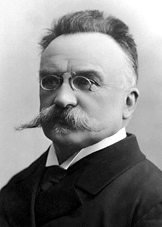 |
Charles Albert Gobat Charles Albert Gobat Charles Albert Gobat was a Swiss lawyer, educational administrator, and politician who jointly received the Nobel Peace Prize with Élie Ducommun in 1902 for their leadership of the Permanent International Peace Bureau.... |
"[For his role as the] first Secretary General of the Inter-Parliamentary Union" | ||
| 1903 | 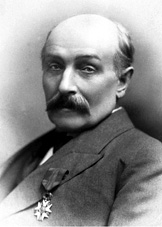 |
William Randal Cremer William Randal Cremer Sir William Randal Cremer usually known by his middle name "Randal", was an English Liberal Member of Parliament and pacifist.... |
United Kingdom | "[For his role as the] the 'first father' of the Inter-Parliamentary Union" |
| 1904 | Institute of International Law Institut de droit international The Institut de droit international is an organization devoted to the study and development of international law, whose membership comprises the world's leading public international lawyers... |
Belgium | "[F]or its efforts as an unofficial body to formulate the general principles of the science of international law" | |
| 1905 | 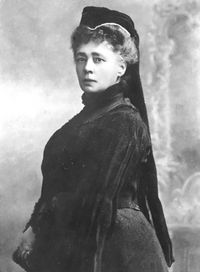 |
Bertha von Suttner Bertha von Suttner Bertha Felicitas Sophie Freifrau von Suttner was an Austrian novelist, radical pacifist, and the first woman to be a Nobel Peace Prize laureate.-Biography:Suttner was born in Prague, Bohemia, the daughter of an impoverished Austrian Field Marshal,... |
Austria-Hungary | For authoring Lay Down Your Arms and contributing to the creation of the Prize |
| 1906 | 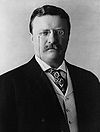 |
Theodore Roosevelt Theodore Roosevelt Theodore "Teddy" Roosevelt was the 26th President of the United States . He is noted for his exuberant personality, range of interests and achievements, and his leadership of the Progressive Movement, as well as his "cowboy" persona and robust masculinity... |
United States | "[F]or his successful mediation to end the Russo-Japanese war Russo-Japanese War The Russo-Japanese War was "the first great war of the 20th century." It grew out of rival imperial ambitions of the Russian Empire and Japanese Empire over Manchuria and Korea... and for his interest in arbitration, having provided the Hague arbitration court Permanent Court of Arbitration The Permanent Court of Arbitration , is an international organization based in The Hague in the Netherlands.-History:The court was established in 1899 as one of the acts of the first Hague Peace Conference, which makes it the oldest institution for international dispute resolution.The creation of... with its very first case" |
| 1907 | 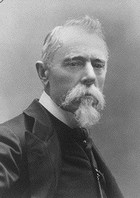 |
Ernesto Teodoro Moneta Ernesto Teodoro Moneta Ernesto Teodoro Moneta was an Italian journalist, nationalist, revolutionary soldier and later a pacifist and Nobel Peace Prize Laureate. He was a native of Milan... |
Italy | "[For his work as a] key leader of the Italian peace movement" |
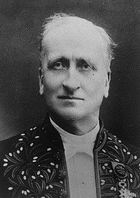 |
Louis Renault Louis Renault (jurist) Louis Renault was a French jurist and educator, the cowinner in 1907 of the Nobel Prize for Peace.... |
France | "[For his work as a] leading French international jurist and a member of the Permanent Court of Arbitration Permanent Court of Arbitration The Permanent Court of Arbitration , is an international organization based in The Hague in the Netherlands.-History:The court was established in 1899 as one of the acts of the first Hague Peace Conference, which makes it the oldest institution for international dispute resolution.The creation of... at The Hague" |
|
| 1908 | 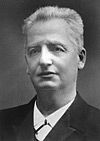 |
Klas Pontus Arnoldson Klas Pontus Arnoldson Klas Pontus Arnoldson was a Swedish author, journalist, politician, and committed pacifist who received the Nobel Peace Prize in 1908. He was a founding member and the first chairman of the Swedish Peace and Arbitration Society.-External links:* * at Find-A-Grave... |
Sweden | "[For his work as] founder of the Swedish Peace and Arbitration League Swedish Peace and Arbitration Society The Swedish Peace and Arbitration Society , or Svenska freds- och skiljedomsföreningen, is a non-governmental organization in Sweden, dedicated to peace, disarmament and democratization. It operates by methods including publishing, lobbying, activism and participating in political debates. SPAS has... " |
| Fredrik Bajer Fredrik Bajer Fredrik Bajer was a Danish writer, teacher, and pacifist politician who received the Nobel Peace Prize in 1908.... |
Denmark | "[For being] the foremost peace advocate in Scandinavia, combining work in the Inter-Parliamentary Union with being the first president of the International Peace Bureau International Peace Bureau International Peace Bureau is the world's oldest international peace federation. It was founded in 1891, and awarded the Nobel Peace Prize in 1910.... " |
||
| 1909 | 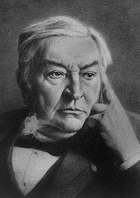 |
Auguste Beernaert Auguste Marie Francois Beernaert Auguste Marie François Beernaert was the 14th Prime Minister of Belgium from October 1884 to March 1894.... |
Belgium | "[For being a] representative to the two Hague conferences, and a leading figure in the Inter-Parliamentary Union" |
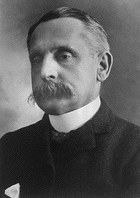 |
Paul Henri d'Estournelles de Constant Paul-Henri-Benjamin d'Estournelles de Constant Paul-Henri-Benjamin Baluet d'Estournelles, baron de Constant de Rébecque , was a French diplomat and politician, advocate of international arbitration and winner of the 1909 Nobel Prize for Peace.-Biography:... |
France | "[For] combined diplomatic work for Franco-German and Franco-British understanding with a distinguished career in international arbitration Permanent Court of Arbitration The Permanent Court of Arbitration , is an international organization based in The Hague in the Netherlands.-History:The court was established in 1899 as one of the acts of the first Hague Peace Conference, which makes it the oldest institution for international dispute resolution.The creation of... " |
|
| 1910 | Permanent International Peace Bureau International Peace Bureau International Peace Bureau is the world's oldest international peace federation. It was founded in 1891, and awarded the Nobel Peace Prize in 1910.... |
Switzerland | "[For acting] as a link between the peace societies of the various countries" | |
| 1911 | 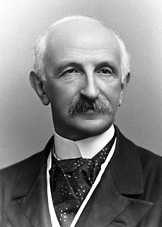 |
Tobias Asser Tobias Michael Carel Asser Tobias Michael Carel Asser was a Dutch lawyer and legal scholar of Jewish background, cowinner of the Nobel Prize for Peace in 1911 for his role in the formation of the Permanent Court of Arbitration at the first Hague peace conference... |
Netherlands | "[For being a] member of the Court of Arbitration Permanent Court of Arbitration The Permanent Court of Arbitration , is an international organization based in The Hague in the Netherlands.-History:The court was established in 1899 as one of the acts of the first Hague Peace Conference, which makes it the oldest institution for international dispute resolution.The creation of... as well as the initiator of the Conferences on International Private Law Hague Conference on Private International Law The Hague Conference on Private International Law is the preeminent organisation in the area of private international law.... " |
 |
Alfred Fried Alfred Hermann Fried Alfred Hermann Fried was an Austrian Jewish pacifist, publicist, journalist, co-founder of the German peace movement, and winner of the Nobel Prize for Peace in 1911.- Life :... |
Austria | "[For his work as] founder of the German Peace Society German Peace Society The German Peace Society was founded in 1892. It still exists and is known as the Deutsche Friedensgesellschaft - Vereinigte KriegsdienstgegnerInnen... " |
|
| 1912 | 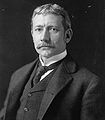 |
Elihu Root Elihu Root Elihu Root was an American lawyer and statesman and the 1912 recipient of the Nobel Peace Prize. He was the prototype of the 20th century "wise man", who shuttled between high-level government positions in Washington, D.C... |
United States | "[F]or his strong interest in international arbitration and for his plan for a world court" |
| 1913 |  |
Henri La Fontaine Henri La Fontaine Henri La Fontaine , was a Belgian international lawyer and president of the International Peace Bureau. He received the Nobel Prize for Peace in 1913.-Biography:... |
Belgium | "[For his work as] head of the International Peace Bureau International Peace Bureau International Peace Bureau is the world's oldest international peace federation. It was founded in 1891, and awarded the Nobel Peace Prize in 1910.... " |
| 1914 | Not awarded | |||
| 1915 | ||||
| 1916 | ||||
| 1917 | International Committee of the Red Cross International Committee of the Red Cross The International Committee of the Red Cross is a private humanitarian institution based in Geneva, Switzerland. States parties to the four Geneva Conventions of 1949 and their Additional Protocols of 1977 and 2005, have given the ICRC a mandate to protect the victims of international and... |
Switzerland | "[For undertaking] the tremendous task of trying to protect the rights of the many prisoners of war on all sides [of World War I World War I World War I , which was predominantly called the World War or the Great War from its occurrence until 1939, and the First World War or World War I thereafter, was a major war centred in Europe that began on 28 July 1914 and lasted until 11 November 1918... ], including their right to establish contacts with their families" |
|
| 1918 | Not awarded | |||
| 1919 | 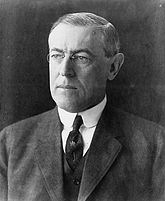 |
Woodrow Wilson Woodrow Wilson Thomas Woodrow Wilson was the 28th President of the United States, from 1913 to 1921. A leader of the Progressive Movement, he served as President of Princeton University from 1902 to 1910, and then as the Governor of New Jersey from 1911 to 1913... |
United States | "[F]or his crucial role in establishing the League League of Nations The League of Nations was an intergovernmental organization founded as a result of the Paris Peace Conference that ended the First World War. It was the first permanent international organization whose principal mission was to maintain world peace... " |
| 1920 | 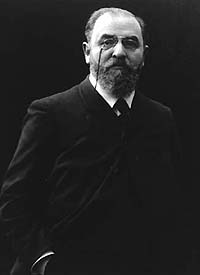 |
Léon Bourgeois Léon Bourgeois -Biography:He was born in Paris, and was trained in law. After holding a subordinate office in the department of public works, he became successively prefect of the Tarn and the Haute-Garonne , and then returned to Paris to enter the ministry of the interior... |
France | "[For his participation] in both the Hague Conferences of 1899 and 1907" and for his work towards "what became the League League of Nations The League of Nations was an intergovernmental organization founded as a result of the Paris Peace Conference that ended the First World War. It was the first permanent international organization whose principal mission was to maintain world peace... to such an extent that he was frequently called its 'spiritual father'" |
| 1921 |  |
Hjalmar Branting Hjalmar Branting was a Swedish politician. He was the leader of the Swedish Social Democratic Party , and Prime Minister during three separate periods . When Branting came to power in 1920, he was the first Social Democratic Prime Minister of Sweden... |
Sweden | "[F]or his work in the League of Nations League of Nations The League of Nations was an intergovernmental organization founded as a result of the Paris Peace Conference that ended the First World War. It was the first permanent international organization whose principal mission was to maintain world peace... " |
| Christian Lange Christian Lous Lange Christian Lous Lange was a Norwegian historian, teacher, and political scientist. He was one of the world's foremost exponents of the theory and practice of internationalism.... |
Norway | "[For his work as] the first secretary of the Norwegian Nobel Committee" and "the secretary-general of the Inter-Parliamentary Union" | ||
| 1922 | Fridtjof Nansen Fridtjof Nansen Fridtjof Wedel-Jarlsberg Nansen was a Norwegian explorer, scientist, diplomat, humanitarian and Nobel Peace Prize laureate. In his youth a champion skier and ice skater, he led the team that made the first crossing of the Greenland interior in 1888, and won international fame after reaching a... |
Norway | "[For] his work in aiding the millions in Russia struggling against famine Russian famine of 1921 The Russian famine of 1921, also known as Povolzhye famine, which began in the early spring of that year, and lasted through 1922, was a severe famine that occurred in Bolshevik Russia... " and "his work for the refugees in Asia Minor and Thrace Population exchange between Greece and Turkey The 1923 population exchange between Greece and Turkey was based upon religious identity, and involved the Greek Orthodox citizens of Turkey and the Muslim citizens of Greece... " |
|
| 1923 | Not awarded | |||
| 1924 | ||||
| 1925 | 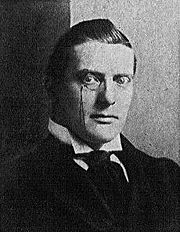 |
Austen Chamberlain Austen Chamberlain Sir Joseph Austen Chamberlain, KG was a British statesman, recipient of the Nobel Peace Prize and half-brother of Neville Chamberlain.- Early life and career :... |
United Kingdom | For work on the Locarno Treaties Locarno Treaties The Locarno Treaties were seven agreements negotiated at Locarno, Switzerland, on 5 October – 16 October 1925 and formally signed in London on 3 December, in which the First World War Western European Allied powers and the new states of central and Eastern Europe sought to secure the post-war... |
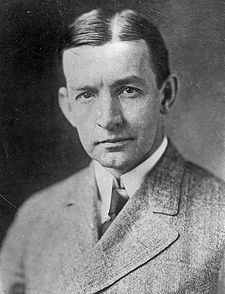 |
Charles G. Dawes Charles G. Dawes Charles Gates Dawes was an American banker and politician who was the 30th Vice President of the United States . For his work on the Dawes Plan for World War I reparations he was a co-recipient of the Nobel Peace Prize. He served in the First World War, was U.S... |
United States | "[F]or [work on] the Dawes Plan for German reparations which was seen as having provided the economic underpinning of the Locarno Pact Locarno Treaties The Locarno Treaties were seven agreements negotiated at Locarno, Switzerland, on 5 October – 16 October 1925 and formally signed in London on 3 December, in which the First World War Western European Allied powers and the new states of central and Eastern Europe sought to secure the post-war... of 1925" |
|
| 1926 | 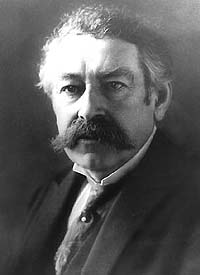 |
Aristide Briand Aristide Briand Aristide Briand was a French statesman who served eleven terms as Prime Minister of France during the French Third Republic and received the 1926 Nobel Peace Prize.- Early life :... |
France | For work on the Locarno Treaties Locarno Treaties The Locarno Treaties were seven agreements negotiated at Locarno, Switzerland, on 5 October – 16 October 1925 and formally signed in London on 3 December, in which the First World War Western European Allied powers and the new states of central and Eastern Europe sought to secure the post-war... |
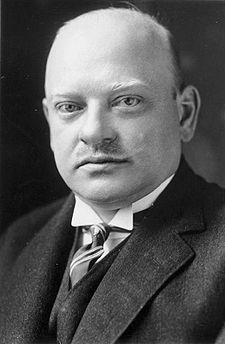 |
Gustav Stresemann Gustav Stresemann was a German politician and statesman who served as Chancellor and Foreign Minister during the Weimar Republic. He was co-laureate of the Nobel Peace Prize in 1926.Stresemann's politics defy easy categorization... |
Germany | ||
| 1927 | Ferdinand Buisson Ferdinand Buisson Ferdinand Édouard Buisson was a French academic, educational bureaucrat, pacifist and Socialist politician... |
France | "[For] contributions to Franco-German popular reconciliation" | |
 |
Ludwig Quidde Ludwig Quidde Ludwig Quidde was a German pacifist who is mainly remembered today for his acerbic criticism of German Emperor Wilhelm II. Quidde's long career spanned four different eras of German history: that of Bismarck ; the Hohenzollern Empire under Wilhelm II ; the Weimar Republic ; and, finally, Nazi... |
Germany | ||
| 1928 | Not awarded | |||
| 1929 | 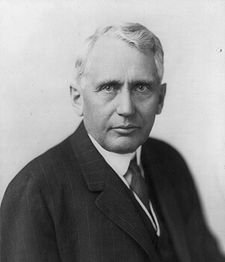 |
Frank B. Kellogg Frank B. Kellogg Frank Billings Kellogg was an American lawyer, politician and statesman who served in the U.S. Senate and as U.S. Secretary of State. He co-authored the Kellogg-Briand Pact, for which he was awarded the Nobel Peace Prize for 1929..- Biography :Kellogg was born in Potsdam, New York, and his family... |
United States | "[F]or the Kellogg-Briand pact, whose signatories agreed to settle all conflicts by peaceful means and renounced war as an instrument of national policy" |
| 1930 | 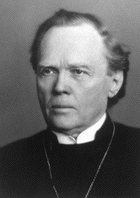 |
Nathan Söderblom Nathan Söderblom Lars Olof Jonathan Söderblom was a Swedish clergyman, Archbishop of Uppsala in the Church of Sweden, and recipient of the 1930 Nobel Peace Prize... |
Sweden | "[F]or his efforts to involve the churches not only in work for ecumenical unity, but also for world peace" |
| 1931 | 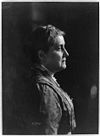 |
Jane Addams Jane Addams Jane Addams was a pioneer settlement worker, founder of Hull House in Chicago, public philosopher, sociologist, author, and leader in woman suffrage and world peace... |
United States | "[F]or her social reform work" and "leading the Women's International League for Peace and Freedom Women's International League for Peace and Freedom The Women's International League for Peace and Freedom was established in the United States in January 1915 as the Woman's Peace Party... " |
| Nicholas Murray Butler | "[For his promotion] of the Briand-Kellogg pact" and for his work as the "leader of the more establishment-oriented part of the American peace movement" | |||
| 1932 | Not awarded | |||
| 1933 |  |
Norman Angell Norman Angell Sir Ralph Norman Angell was an English lecturer, journalist, author, and Member of Parliament for the Labour Party.Angell was one of the principal founders of the Union of Democratic Control... |
United Kingdom | For authoring The Great Illusion The Great Illusion The Great Illusion is a book by Norman Angell, first published in Britain in 1909 under the title Europe's Optical Illusion and republished in 1910 and subsequently in various enlarged and revised editions under the title The Great Illusion.... and for being a "supporter of the League of Nations as well as an influential publicist [and] educator for peace in general" |
| 1934 |  |
Arthur Henderson Arthur Henderson Arthur Henderson was a British iron moulder and Labour politician. He was the 1934 Nobel Peace Prize Laureate and he served three short terms as the Leader of the Labour Party from 1908–1910, 1914–1917 and 1931-1932.... |
United Kingdom | "[F]or his work for the League League of Nations The League of Nations was an intergovernmental organization founded as a result of the Paris Peace Conference that ended the First World War. It was the first permanent international organization whose principal mission was to maintain world peace... , particularly its efforts in disarmament" |
| 1935 | 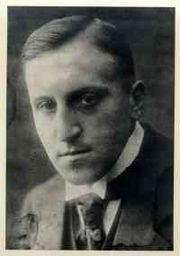 |
Carl von Ossietzky Carl von Ossietzky Carl von Ossietzky was a German pacifist and the recipient of the 1935 Nobel Peace Prize. He was convicted of high treason and espionage in 1931 after publishing details of Germany's alleged violation of the Treaty of Versailles by rebuilding an air force, the predecessor of the Luftwaffe, and... |
Germany | "[For his] struggle against Germany's rearmament" |
| 1936 |  |
Carlos Saavedra Lamas Carlos Saavedra Lamas Carlos Saavedra Lamas was an Argentine academic and politician, and in 1936, the first Latin American Nobel Peace Prize recipient.-Biography:... |
Argentina | "[F]or his mediation of an end to the Chaco War Chaco War The Chaco War was fought between Bolivia and Paraguay over control of the northern part of the Gran Chaco region of South America, which was incorrectly thought to be rich in oil. It is also referred to as La Guerra de la Sed in literary circles for being fought in the semi-arid Chaco... between Paraguay and Bolivia" |
| 1937 |  |
Robert Cecil Robert Cecil, 1st Viscount Cecil of Chelwood Edgar Algernon Robert Gascoyne-Cecil, 1st Viscount Cecil of Chelwood CH, PC, QC , known as Lord Robert Cecil from 1868 to 1923, was a lawyer, politician and diplomat in the United Kingdom... |
United Kingdom | For his work with the League of Nations League of Nations The League of Nations was an intergovernmental organization founded as a result of the Paris Peace Conference that ended the First World War. It was the first permanent international organization whose principal mission was to maintain world peace... |
| 1938 |  |
Nansen International Office for Refugees Office international Nansen pour les réfugiés The Office International Nansen pour les Réfugiés , was an organization of the League of Nations, which was internationally in charge of refugees from war areas from 1930 to 1939. It is noted for developing the Nansen passport which allowed stateless people to travel between countries... |
Switzerland | For its work in aiding refugees |
| 1939 | Not awarded | |||
| 1940 | ||||
| 1941 | ||||
| 1942 | ||||
| 1943 | ||||
| 1944 | International Committee of the Red Cross International Committee of the Red Cross The International Committee of the Red Cross is a private humanitarian institution based in Geneva, Switzerland. States parties to the four Geneva Conventions of 1949 and their Additional Protocols of 1977 and 2005, have given the ICRC a mandate to protect the victims of international and... |
Switzerland | "[F]or the great work it has performed during the war World War II World War II, or the Second World War , was a global conflict lasting from 1939 to 1945, involving most of the world's nations—including all of the great powers—eventually forming two opposing military alliances: the Allies and the Axis... in behalf of humanity" |
|
| 1945 |  |
Cordell Hull Cordell Hull Cordell Hull was an American politician from the U.S. state of Tennessee. He is best known as the longest-serving Secretary of State, holding the position for 11 years in the administration of President Franklin Delano Roosevelt during much of World War II... |
United States | "[For] his fight against isolationism at home, his efforts to create a peace bloc of states on the American continents, and his work for the United Nations Organization United Nations The United Nations is an international organization whose stated aims are facilitating cooperation in international law, international security, economic development, social progress, human rights, and achievement of world peace... " |
| 1946 |  |
Emily Greene Balch Emily Greene Balch Emily Greene Balch was an American academic, writer, and pacifist who received the Nobel Peace Prize in 1946 , notably for her work with the Women's International League for Peace and Freedom .Born in the Jamaica Plain neighborhood of Boston into an affluent family, she was amongst the first... |
United States | "Formerly Professor of History and Sociology; Honorary International President, Women's International League for Peace and Freedom Women's International League for Peace and Freedom The Women's International League for Peace and Freedom was established in the United States in January 1915 as the Woman's Peace Party... " |
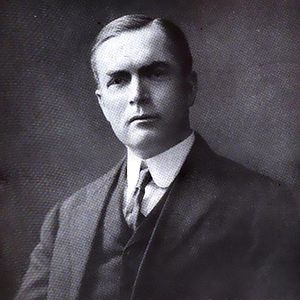 |
John Raleigh Mott John Mott John Raleigh Mott was a long-serving leader of the YMCA and the World Student Christian Federation... |
"Chairman, International Missionary Council; President, World Alliance of Young Men's Christian Associations" | ||
| 1947 | Friends Service Council Quaker Peace and Social Witness Quaker Peace & Social Witness , previously known as the Friends Service Council, and then as Quaker Peace and Service, is one of the central committees of Britain Yearly Meeting of the Religious Society of Friends - the national organisation of Quakers in Britain. It works to promote British... |
United Kingdom | "compassion for others and the desire to help them" | |
| American Friends Service Committee American Friends Service Committee The American Friends Service Committee is a Religious Society of Friends affiliated organization which works for peace and social justice in the United States and around the world... |
United States | |||
| 1948 | Not awarded because "there was no suitable living candidate." | |||
| 1949 | The Lord Boyd-Orr John Boyd Orr, 1st Baron Boyd-Orr John Boyd Orr, 1st Baron Boyd-Orr CH, DSO, MC, FRS , known as Sir John Boyd Orr from 1935 to 1949, was a Scottish teacher, doctor, biologist and politician who received the Nobel Peace Prize for his scientific research into nutrition and his work as the first Director-General of the United Nations... |
United Kingdom | "Physician; Alimentary Politician; Prominent organizer and Director, General Food and Agricultural Organization; President, National Peace Council National Peace Council The National Peace Council, founded in 1908, and disbanded in 2000, acted as the co-ordinating body for almost 200 groups across Britain, with a membership ranging from small village peace groups to national trade unions and local authorities... and World Union of Peace Organizations" |
|
| 1950 |  |
Ralph Bunche Ralph Bunche Ralph Johnson Bunche or 1904December 9, 1971) was an American political scientist and diplomat who received the 1950 Nobel Peace Prize for his late 1940s mediation in Palestine. He was the first person of color to be so honored in the history of the Prize... |
United States | "Professor, Harvard University Cambridge, MA; Director, division of Trusteeship, U.N.; Acting Mediator in Palestine, 1948" |
| 1951 | Léon Jouhaux Léon Jouhaux Léon Jouhaux was a French trade union leader who received the Nobel Peace Prize in 1951.Jouhaux's father worked in a match factory in Aubervilliers. His secondary schooling ended when his father's earnings were stopped by a strike. He gained employment at the factory at age sixteen and immediately... |
France | "President of the International Committee of the European Council, vice president of the International Confederation of Free Trade Unions International Confederation of Free Trade Unions The International Confederation of Free Trade Unions was an international trade union. It came into being on 7 December 1949 following a split within the World Federation of Trade Unions , and was dissolved on 31 October 2006 when it merged with the World Confederation of Labour to form the... , vice president of the World Federation of Trade Unions World Federation of Trade Unions The World Federation of Trade Unions was established in 1945 to replace the International Federation of Trade Unions. Its mission was to bring together trade unions across the world in a single international organization, much like the United Nations... , member of the ILO Council, delegate to the United Nations" |
|
| 1952 | 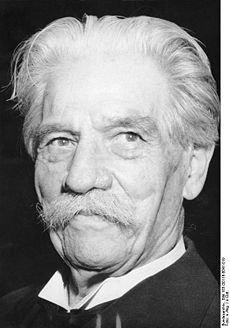 |
Albert Schweitzer Albert Schweitzer Albert Schweitzer OM was a German theologian, organist, philosopher, physician, and medical missionary. He was born in Kaysersberg in the province of Alsace-Lorraine, at that time part of the German Empire... |
France | "Missionary surgeon; Founder of Lambaréné Lambaréné Lambaréné is the capital of the political district Moyen-Ogooué in Gabon. The city counts 24,000 inhabitants and is located 75 kilometres south of the equator.... (République de Gabon)" |
| 1953 | 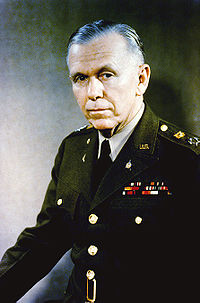 |
George Catlett Marshall George Marshall George Catlett Marshall was an American military leader, Chief of Staff of the Army, Secretary of State, and the third Secretary of Defense... |
United States | "General President American Red Cross; Former Secretary of State and of Defense; Delegate U.N.; Originator of [the] "Marshall Plan Marshall Plan The Marshall Plan was the large-scale American program to aid Europe where the United States gave monetary support to help rebuild European economies after the end of World War II in order to combat the spread of Soviet communism. The plan was in operation for four years beginning in April 1948... "" |
| 1954 | United Nations High Commissioner for Refugees United Nations High Commissioner for Refugees The Office of the United Nations High Commissioner for Refugees , also known as The UN Refugee Agency is a United Nations agency mandated to protect and support refugees at the request of a government or the UN itself and assists in their voluntary repatriation, local integration or resettlement to... |
Switzerland | "An international relief organization founded by the U.N. in 1951" | |
| 1955 | Not awarded | |||
| 1956 | ||||
| 1957 | 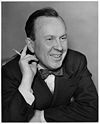 |
Lester Bowles Pearson Lester B. Pearson Lester Bowles "Mike" Pearson, PC, OM, CC, OBE was a Canadian professor, historian, civil servant, statesman, diplomat, and politician, who won the Nobel Peace Prize in 1957 for organizing the United Nations Emergency Force to resolve the Suez Canal Crisis... |
Canada | "former Secretary of State for External Affairs of Canada; former President of the 7th Session of the United Nations General Assembly"; "for his role in trying to end the Suez conflict Suez Crisis The Suez Crisis, also referred to as the Tripartite Aggression, Suez War was an offensive war fought by France, the United Kingdom, and Israel against Egypt beginning on 29 October 1956. Less than a day after Israel invaded Egypt, Britain and France issued a joint ultimatum to Egypt and Israel,... and to solve the Middle East question through the United Nations." |
| 1958 | 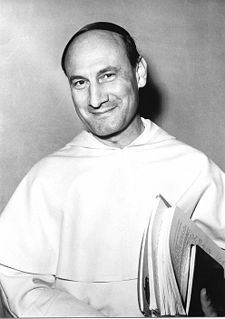 |
Georges Pire Dominique Pire Dominique Pire was a Belgian Dominican friar whose work helping refugees in post-World War II Europe saw him receive the Nobel Peace Prize in 1958... |
Belgium | "Father in the Dominican Order Dominican Order The Order of Preachers , after the 15th century more commonly known as the Dominican Order or Dominicans, is a Catholic religious order founded by Saint Dominic and approved by Pope Honorius III on 22 December 1216 in France... ; Leader of the relief organization for refugees "L'Europe du Coeur au Service du Monde"" |
| 1959 | Philip J. Noel-Baker Philip Noel-Baker, Baron Noel-Baker by Philip Noel-Baker with other authorsby others* Lloyd, Lorna: Philip Noel-Baker and the Peace Through Law in -External links:... |
United Kingdom | "Member of Parliament; lifelong ardent worker for international peace and co-operation" | |
| 1960 | .jpg) |
Albert Lutuli Albert Lutuli Albert John Lutuli , also known by his Zulu name Mvumbi, was a South African teacher and politician. Lutuli was elected president of the African National Congress , at the time an umbrella organisation that led opposition to the white minority government in South Africa... |
South Africa | "President of the African National Congress African National Congress The African National Congress is South Africa's governing Africanist political party, supported by its tripartite alliance with the Congress of South African Trade Unions and the South African Communist Party , since the establishment of non-racial democracy in April 1994. It defines itself as a... ," "was in the very forefront of the struggle against apartheid in South Africa." |
| 1961 | 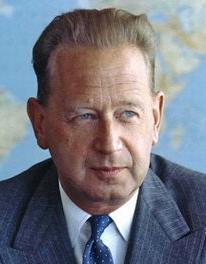 |
Dag Hammarskjöld Dag Hammarskjöld Dag Hjalmar Agne Carl Hammarskjöld was a Swedish diplomat, economist, and author. An early Secretary-General of the United Nations, he served from April 1953 until his death in a plane crash in September 1961. He is the only person to have been awarded a posthumous Nobel Peace Prize. Hammarskjöld... |
Sweden | "Secretary General of the U.N.," awarded "for strengthening the organization." |
| 1962 | 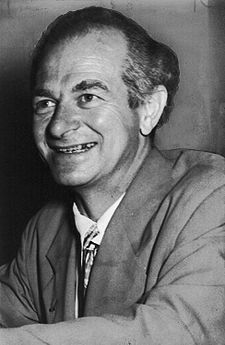 |
Linus Carl Pauling Linus Pauling Linus Carl Pauling was an American chemist, biochemist, peace activist, author, and educator. He was one of the most influential chemists in history and ranks among the most important scientists of the 20th century... |
United States | "for his campaign against nuclear weapons testing" |
| 1963 | International Committee of the Red Cross International Committee of the Red Cross The International Committee of the Red Cross is a private humanitarian institution based in Geneva, Switzerland. States parties to the four Geneva Conventions of 1949 and their Additional Protocols of 1977 and 2005, have given the ICRC a mandate to protect the victims of international and... |
Switzerland | ||
| League of Red Cross Societies International Federation of Red Cross and Red Crescent Societies The International Federation of Red Cross and Red Crescent Societies is a humanitarian institution that is part of the International Red Cross and Red Crescent Movement along with the ICRC and 186 distinct National Societies... |
||||
| 1964 | 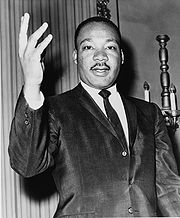 |
Martin Luther King, Jr. Martin Luther King, Jr. Martin Luther King, Jr. was an American clergyman, activist, and prominent leader in the African-American Civil Rights Movement. He is best known for being an iconic figure in the advancement of civil rights in the United States and around the world, using nonviolent methods following the... |
United States | Campaigner for civil rights Civil rights Civil and political rights are a class of rights that protect individuals' freedom from unwarranted infringement by governments and private organizations, and ensure one's ability to participate in the civil and political life of the state without discrimination or repression.Civil rights include... , "first person in the Western world to have shown us that a struggle can be waged without violence." |
| 1965 |  |
United Nations International Children's Emergency Fund (UNICEF) United Nations Children's Fund United Nations Children's Fund was created by the United Nations General Assembly on December 11, 1946, to provide emergency food and healthcare to children in countries that had been devastated by World War II... |
United Nations | "An international aid organization." |
| 1966 | Not awarded | |||
| 1967 | ||||
| 1968 | 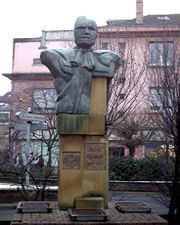 |
René Cassin René Cassin René Samuel Cassin was a French jurist, law professor and judge. A soldier in World War I, he later went on to form the Union Fédérale, a leftist, pacifist Veterans organisation... |
France | "President of the European Court for Human Rights European Court of Human Rights The European Court of Human Rights in Strasbourg is a supra-national court established by the European Convention on Human Rights and hears complaints that a contracting state has violated the human rights enshrined in the Convention and its protocols. Complaints can be brought by individuals or... " |
| 1969 |  |
International Labour Organization International Labour Organization The International Labour Organization is a specialized agency of the United Nations that deals with labour issues pertaining to international labour standards. Its headquarters are in Geneva, Switzerland. Its secretariat — the people who are employed by it throughout the world — is known as the... |
United Nations | |
| 1970 | 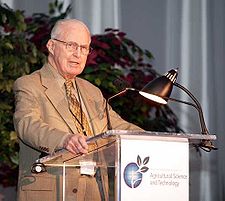 |
Norman E. Borlaug Norman Borlaug Norman Ernest Borlaug was an American agronomist, humanitarian, and Nobel laureate who has been called "the father of the Green Revolution". Borlaug was one of only six people to have won the Nobel Peace Prize, the Presidential Medal of Freedom and the Congressional Gold Medal... |
United States | "International Maize and Wheat Improvement Center International Maize and Wheat Improvement Center The International Maize and Wheat Improvement Center is a non-profit research and training institution dedicated to both the development of improved varieties of wheat and maize, and introducing improved agricultural practices to farmers, thereby improving their... ;" "for his contributions to the "green revolution Green Revolution Green Revolution refers to a series of research, development, and technology transfer initiatives, occurring between the 1940s and the late 1970s, that increased agriculture production around the world, beginning most markedly in the late 1960s.... " that was having such an impact on food production particularly in Asia and in Latin America." |
| 1971 | 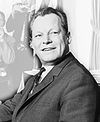 |
Willy Brandt Willy Brandt Willy Brandt, born Herbert Ernst Karl Frahm , was a German politician, Mayor of West Berlin 1957–1966, Chancellor of West Germany 1969–1974, and leader of the Social Democratic Party of Germany 1964–1987.... |
West Germany | "Chancellor of the Federal Republic of Germany; for West Germany West Germany West Germany is the common English, but not official, name for the Federal Republic of Germany or FRG in the period between its creation in May 1949 to German reunification on 3 October 1990.... 's Ostpolitik Ostpolitik Neue Ostpolitik , or Ostpolitik for short, refers to the normalization of relations between the Federal Republic of Germany and Eastern Europe, particularly the German Democratic Republic beginning in 1969... " |
| 1972 | Not awarded | |||
| 1973 |  |
Henry Kissinger Henry Kissinger Heinz Alfred "Henry" Kissinger is a German-born American academic, political scientist, diplomat, and businessman. He is a recipient of the Nobel Peace Prize. He served as National Security Advisor and later concurrently as Secretary of State in the administrations of Presidents Richard Nixon and... |
United States | "For the 1973 Paris agreement Paris Peace Accords The Paris Peace Accords of 1973 intended to establish peace in Vietnam and an end to the Vietnam War, ended direct U.S. military involvement, and temporarily stopped the fighting between North and South Vietnam... intended to bring about a cease-fire in the Vietnam war and a withdrawal of the American forces" |
| Le Duc Tho Le Duc Tho Lê Đức Thọ , born Phan Đình Khải in Ha Nam province, was a Vietnamese revolutionary, general, diplomat, and politician, who was awarded the Nobel Peace Prize jointly with United States Secretary of State Henry Kissinger in 1973, although he declined it.... |
North Vietnam | |||
| 1974 | 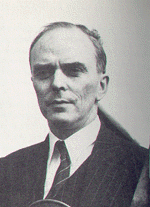 |
Seán MacBride Seán MacBride Seán MacBride was an Irish government minister and prominent international politician as well as a Chief of Staff of the IRA.... |
Ireland | "President of the International Peace Bureau International Peace Bureau International Peace Bureau is the world's oldest international peace federation. It was founded in 1891, and awarded the Nobel Peace Prize in 1910.... ; President of the Commission of Namibia Namibia Namibia, officially the Republic of Namibia , is a country in southern Africa whose western border is the Atlantic Ocean. It shares land borders with Angola and Zambia to the north, Botswana to the east and South Africa to the south and east. It gained independence from South Africa on 21 March... ." "For his strong interest in human rights: piloting the European Convention on Human Rights through the Council of Europe, helping found and then lead Amnesty International and serving as secretary-general of the International Commission of Jurists" |
| Eisaku Satō Eisaku Sato This article is about the Prime Minister of Japan. For the governor of Fukushima Prefecture of Japan of the same name, see Eisaku Satō .... |
Japan | "Prime Minister of Japan," "for his renunciation of the nuclear option for Japan and his efforts to further regional reconciliation" | ||
| 1975 | Andrei Dmitrievich Sakharov Andrei Sakharov Andrei Dmitrievich Sakharov was a Soviet nuclear physicist, dissident and human rights activist. He earned renown as the designer of the Soviet Union's Third Idea, a codename for Soviet development of thermonuclear weapons. Sakharov was an advocate of civil liberties and civil reforms in the... |
Soviet Union | "[for his] struggle for human rights, for disarmament, and for cooperation between all nations" | |
| 1976 | 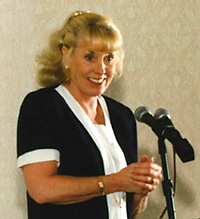 |
Betty Williams | United Kingdom | "Founder[s] of the Northern Ireland Peace Movement (later renamed Community of Peace People)" |
| Mairead Corrigan Mairead Corrigan Mairead Maguire , also known as Mairead Corrigan Maguire and formerly as Mairéad Corrigan, is a Northern Irish peace activist. She co-founded, with Betty Williams and Ciaran McKeown, the Community of Peace People, an organisation dedicated to encouraging a peaceful resolution of the Troubles in... |
||||
| 1977 | Amnesty International Amnesty International Amnesty International is an international non-governmental organisation whose stated mission is "to conduct research and generate action to prevent and end grave abuses of human rights, and to demand justice for those whose rights have been violated."Following a publication of Peter Benenson's... |
United Kingdom | "[for] protecting the human rights Human rights Human rights are "commonly understood as inalienable fundamental rights to which a person is inherently entitled simply because she or he is a human being." Human rights are thus conceived as universal and egalitarian . These rights may exist as natural rights or as legal rights, in both national... of prisoners of conscience Prisoner of conscience Prisoner of conscience is a term defined in Peter Benenson's 1961 article "The Forgotten Prisoners" often used by the human rights group Amnesty International. It can refer to anyone imprisoned because of their race, religion, or political views... " |
|
| 1978 | 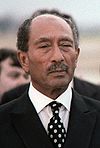 |
Mohamed Anwar Al-Sadat | Egypt | "for the Camp David Agreement, which brought about a negotiated peace between Egypt and Israel" |
 |
Menachem Begin Menachem Begin ' was a politician, founder of Likud and the sixth Prime Minister of the State of Israel. Before independence, he was the leader of the Zionist militant group Irgun, the Revisionist breakaway from the larger Jewish paramilitary organization Haganah. He proclaimed a revolt, on 1 February 1944,... |
Israel | ||
| 1979 | 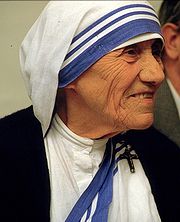 |
Mother Teresa Mother Teresa Mother Teresa , born Agnes Gonxha Bojaxhiu , was a Roman Catholic nun of Albanian ethnicity and Indian citizenship, who founded the Missionaries of Charity in Calcutta, India, in 1950... |
India | "Founder of Missionaries of Charity" |
| 1980 | Adolfo Pérez Esquivel Adolfo Pérez Esquivel Adolfo Pérez Esquivel is an Argentine sculptor, architect and pacifist. He was the recipient of the 1980 Nobel Peace Prize.-Biography:Pérez Esquivel was born in Buenos Aires to a Spanish fisherman who emigrated to Argentina... |
Argentina | "Human rights leader;" "founded non-violent human rights organizations to fight the military junta that was ruling his country (Argentina)." | |
| 1981 | United Nations High Commissioner for Refugees United Nations High Commissioner for Refugees The Office of the United Nations High Commissioner for Refugees , also known as The UN Refugee Agency is a United Nations agency mandated to protect and support refugees at the request of a government or the UN itself and assists in their voluntary repatriation, local integration or resettlement to... |
United Nations | "An international relief organization founded by the U.N. in 1951" | |
| 1982 | 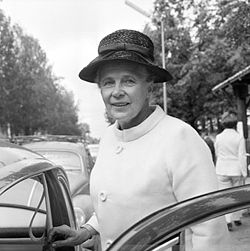 |
Alva Myrdal Alva Myrdal Alva Myrdal was a Swedish sociologist and politician. She received the Nobel Peace Prize in 1982. She married Gunnar Myrdal in 1924.... |
Sweden | "[for] their magnificent work in the disarmament negotiations Treaty of Tlatelolco The Treaty of Tlatelolco is the conventional name given to the Treaty for the Prohibition of Nuclear Weapons in Latin America and the Caribbean... of the United Nations, where they have both played crucial roles and won international recognition" |
| Alfonso García Robles Alfonso García Robles Alfonso García Robles was a Mexican diplomat and politician who, in conjunction with Sweden's Alva Myrdal, received the Nobel Peace Prize in 1982.... |
Mexico | |||
| 1983 |  |
Lech Walesa Lech Wałęsa Lech Wałęsa is a Polish politician, trade-union organizer, and human-rights activist. A charismatic leader, he co-founded Solidarity , the Soviet bloc's first independent trade union, won the Nobel Peace Prize in 1983, and served as President of Poland between 1990 and 95.Wałęsa was an electrician... |
Poland | "Founder of Solidarność; campaigner for human rights" |
| 1984 |  |
Desmond Tutu Desmond Tutu Desmond Mpilo Tutu is a South African activist and retired Anglican bishop who rose to worldwide fame during the 1980s as an opponent of apartheid... |
South Africa | "Bishop of Johannesburg; former Secretary General, South African Council of Churches" |
| 1985 | International Physicians for the Prevention of Nuclear War International Physicians for the Prevention of Nuclear War is a non-partisan federation of national medical groups in 63 countries, representing tens of thousands of doctors, medical students, other health workers, and concerned citizens who share the common goal of creating a more peaceful and secure world freed from the threat of nuclear annihilation... |
United States | For "authoritative information and by creating an awareness of the catastrophic consequences of atomic warfare. The committee believes that this in turn contributes to an increase in the pressure of public opposition to the proliferation of atomic weapons and to a redefining of priorities, with greater attention being paid to health and other humanitarian issues." | |
| 1986 |  |
Elie Wiesel Elie Wiesel Sir Eliezer "Elie" Wiesel KBE; born September 30, 1928) is a Hungarian-born Jewish-American writer, professor, political activist, Nobel Laureate, and Holocaust survivor. He is the author of 57 books, including Night, a work based on his experiences as a prisoner in the Auschwitz, Buna, and... |
United States | "Chairman of "The President's Commission on the Holocaust"" |
| 1987 |  |
Óscar Arias Óscar Arias Óscar Arias Sánchez is a Costa Rican politician who was President of Costa Rica from 2006 to 2010. He previously served as President from 1986 to 1990 and received the Nobel Peace Prize in 1987 for his efforts to end civil wars then raging in several other Central American countries.He is also a... |
Costa Rica | "for his work for peace in Central America, efforts which led to the accord signed in Guatemala on August 7 this year" |
| 1988 |  |
United Nations Peace-Keeping Forces United Nations peacekeeping Peacekeeping by the United Nations is a role held by the Department of Peacekeeping Operations as "a unique and dynamic instrument developed by the Organization as a way to help countries torn by conflict create the conditions for lasting peace"... |
United Nations | "[for] their efforts [that] have made important contributions towards the realization of one of the fundamental tenets of the United Nations" |
| 1989 |  |
Tenzin Gyatso, 14th Dalai Lama 14th Dalai Lama The 14th Dalai Lama is the 14th and current Dalai Lama. Dalai Lamas are the most influential figures in the Gelugpa lineage of Tibetan Buddhism, although the 14th has consolidated control over the other lineages in recent years... |
Tibet | "In his struggle for the liberation of Tibet [he] consistently has opposed the use of violence. He has instead advocated peaceful solutions based upon tolerance and mutual respect in order to preserve the historical and cultural heritage of his people." |
| 1990 | 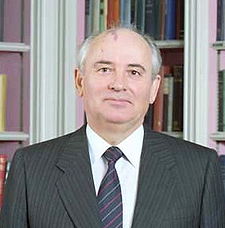 |
Mikhail Sergeyevich Gorbachev Mikhail Gorbachev Mikhail Sergeyevich Gorbachev is a former Soviet statesman, having served as General Secretary of the Communist Party of the Soviet Union from 1985 until 1991, and as the last head of state of the USSR, having served from 1988 until its dissolution in 1991... |
Soviet Union | President of the Soviet Union President of the Soviet Union The President of the Soviet Union , officially called President of the USSR was the Head of State of the USSR from 15 March 1990 to 25 December 1991. Mikhail Gorbachev was the only person to occupy the office. Gorbachev was also General Secretary of the Communist Party of the Soviet Union between... , "for his leading role in the peace process which today characterizes important parts of the international community" |
| 1991 | Aung San Suu Kyi Aung San Suu Kyi Aung San Suu Kyi, AC is a Burmese opposition politician and the General Secretary of the National League for Democracy. In the 1990 general election, her National League for Democracy party won 59% of the national votes and 81% of the seats in Parliament. She had, however, already been detained... |
Burma | "for her non-violent struggle for democracy and human rights" | |
| 1992 | 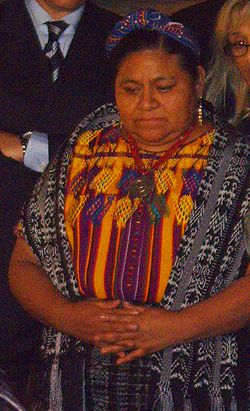 |
Rigoberta Menchú Rigoberta Menchú Rigoberta Menchú Tum is an indigenous Guatemalan, of the K'iche' ethnic group. Menchú has dedicated her life to publicizing the plight of Guatemala's indigenous peoples during and after the Guatemalan Civil War , and to promoting indigenous rights in the country... |
Guatemala | "[for] her work for social justice and ethno-cultural reconciliation based on respect for the rights of indigenous peoples" |
| 1993 | Nelson Mandela Nelson Mandela Nelson Rolihlahla Mandela served as President of South Africa from 1994 to 1999, and was the first South African president to be elected in a fully representative democratic election. Before his presidency, Mandela was an anti-apartheid activist, and the leader of Umkhonto we Sizwe, the armed wing... |
South Africa | "for their work for the peaceful termination of the apartheid regime, and for laying the foundations for a new democratic South Africa" | |
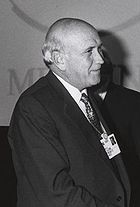 |
Frederik Willem de Klerk Frederik Willem de Klerk Frederik Willem de Klerk , often known as F. W. de Klerk, is the former seventh and last State President of apartheid-era South Africa, serving from September 1989 to May 1994... |
|||
| 1994 |  |
Yasser Arafat Yasser Arafat Mohammed Yasser Abdel Rahman Abdel Raouf Arafat al-Qudwa al-Husseini , popularly known as Yasser Arafat or by his kunya Abu Ammar , was a Palestinian leader and a Laureate of the Nobel Prize. He was Chairman of the Palestine Liberation Organization , President of the Palestinian National Authority... |
Palestine | "to honour a political act which called for great courage on both sides, and which has opened up opportunities for a new development towards fraternity in the Middle East." |
_cropped.jpg) |
Yitzhak Rabin Yitzhak Rabin ' was an Israeli politician, statesman and general. He was the fifth Prime Minister of Israel, serving two terms in office, 1974–77 and 1992 until his assassination in 1995.... |
Israel | ||
 |
Shimon Peres Shimon Peres GCMG is the ninth President of the State of Israel. Peres served twice as the eighth Prime Minister of Israel and once as Interim Prime Minister, and has been a member of 12 cabinets in a political career spanning over 66 years... |
|||
| 1995 |  |
Joseph Rotblat Joseph Rotblat Sir Joseph Rotblat, KCMG, CBE, FRS , was a Polish-born, British-naturalised physicist.His work on nuclear fallout was a major contribution to the agreement of the Partial Test Ban Treaty... |
United Kingdom | "for their efforts to diminish the part played by nuclear arms in international politics and, in the longer run, to eliminate such arms" |
| Pugwash Conferences on Science and World Affairs Pugwash Conferences on Science and World Affairs The Pugwash Conferences on Science and World Affairs is an international organization that brings together scholars and public figures to work toward reducing the danger of armed conflict and to seek solutions to global security threats... |
Canada | |||
| 1996 | 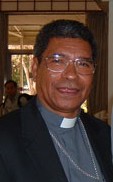 |
Carlos Filipe Ximenes Belo Carlos Filipe Ximenes Belo Carlos Filipe Ximenes Belo SDB, GCL is an East Timorese Roman Catholic bishop. Along with José Ramos-Horta, he received the 1996 Nobel Peace Prize for work "towards a just and peaceful solution to the conflict in East Timor."... |
East Timor | "for their work towards a just and peaceful solution to the conflict in East Timor." |
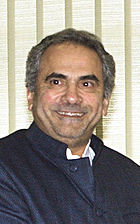 |
José Ramos-Horta | |||
| 1997 | International Campaign to Ban Landmines International Campaign to Ban Landmines The International Campaign to Ban Landmines is a coalition of non-governmental organizations working for a world free of anti-personnel landmines and cluster munitions, where mine and cluster munitions survivors see their rights respected and can lead fulfilling lives.The coalition was formed in... |
Switzerland | "for their work for the banning and clearing of anti-personnel mines" | |
 |
Jody Williams Jody Williams Jody Williams is an American teacher and aid worker who received the 1997 Nobel Peace Prize jointly with the campaign she worked for, the International Campaign to Ban Landmines... |
United States | ||
| 1998 |  |
John Hume John Hume John Hume is a former Irish politician from Derry, Northern Ireland. He was a founding member of the Social Democratic and Labour Party, and was co-recipient of the 1998 Nobel Peace Prize, with David Trimble.... |
United Kingdom | "for their efforts to find a peaceful solution to the conflict in Northern Ireland" |
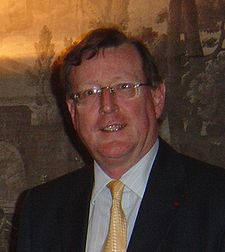 |
David Trimble | United Kingdom | ||
| 1999 | Médecins Sans Frontières Médecins Sans Frontières ' , or Doctors Without Borders, is a secular humanitarian-aid non-governmental organization best known for its projects in war-torn regions and developing countries facing endemic diseases. Its headquarters are in Geneva, Switzerland... |
Switzerland | "in recognition of the organization's pioneering humanitarian work on several continents" | |
| 2000 | .png) |
Kim Dae Jung Kim Dae Jung Kim Dae-jung was President of South Korea from 1998 to 2003, and the 2000 Nobel Peace Prize recipient. He came to be called the "Nelson Mandela of Asia" for his long-standing opposition to authoritarian rule.-Early life:... |
South Korea | "for his work for democracy and human rights in South Korea and in East Asia in general, and for peace and reconciliation with North Korea in particular" |
| 2001 |  |
United Nations United Nations The United Nations is an international organization whose stated aims are facilitating cooperation in international law, international security, economic development, social progress, human rights, and achievement of world peace... |
United Nations | "for their work for a better organized and more peaceful world" |
 |
Kofi Annan Kofi Annan Kofi Atta Annan is a Ghanaian diplomat who served as the seventh Secretary-General of the UN from 1 January 1997 to 31 December 2006... |
Ghana | ||
| 2002 | 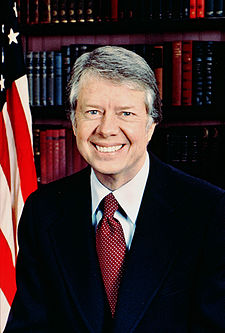 |
Jimmy Carter Jimmy Carter James Earl "Jimmy" Carter, Jr. is an American politician who served as the 39th President of the United States and was the recipient of the 2002 Nobel Peace Prize, the only U.S. President to have received the Prize after leaving office... |
United States | "for his decades of untiring effort to find peaceful solutions to international conflicts, to advance democracy and human rights, and to promote economic and social development" |
| 2003 | 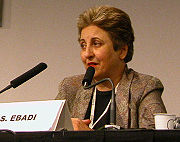 |
Shirin Ebadi Shirin Ebadi Shirin Ebadi is an Iranian lawyer, a former judge and human rights activist and founder of Defenders of Human Rights Center in Iran. On 10 October 2003, Ebadi was awarded the Nobel Peace Prize for her significant and pioneering efforts for democracy and human rights, especially women's,... |
Iran | "for her efforts for democracy Democracy Democracy is generally defined as a form of government in which all adult citizens have an equal say in the decisions that affect their lives. Ideally, this includes equal participation in the proposal, development and passage of legislation into law... and human rights Human rights Human rights are "commonly understood as inalienable fundamental rights to which a person is inherently entitled simply because she or he is a human being." Human rights are thus conceived as universal and egalitarian . These rights may exist as natural rights or as legal rights, in both national... . She has focused especially on the struggle for the rights of women Women's rights Women's rights are entitlements and freedoms claimed for women and girls of all ages in many societies.In some places these rights are institutionalized or supported by law, local custom, and behaviour, whereas in others they may be ignored or suppressed... and children Children's rights Children's rights are the human rights of children with particular attention to the rights of special protection and care afforded to the young, including their right to association with both biological parents, human identity as well as the basic needs for food, universal state-paid education,... ." |
| 2004 | Wangari Muta Maathai Wangari Maathai Wangari Muta Mary Jo Maathai was a Kenyan environmental and political activist. She was educated in the United States at Mount St. Scholastica and the University of Pittsburgh, as well as the University of Nairobi in Kenya... |
Kenya | "for her contribution to sustainable development, democracy and peace" | |
| 2005 | 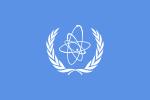 |
International Atomic Energy Agency International Atomic Energy Agency The International Atomic Energy Agency is an international organization that seeks to promote the peaceful use of nuclear energy, and to inhibit its use for any military purpose, including nuclear weapons. The IAEA was established as an autonomous organization on 29 July 1957... |
United Nations | "for their efforts to prevent nuclear energy from being used for military purposes and to ensure that nuclear energy for peaceful purposes is used in the safest possible way" |
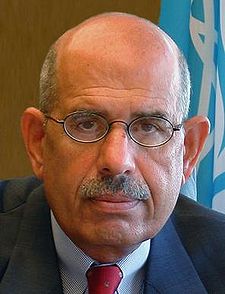 |
Mohamed ElBaradei | Egypt | ||
| 2006 2006 Nobel Peace Prize The 2006 Nobel Peace Prize was awarded to Muhammad Yunus and Grameen Bank "for their efforts through microcredit to create economic and social development from below".... |
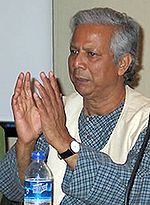 |
Muhammad Yunus Muhammad Yunus Muhammad Yunus is a Bangladeshi economist and founder of the Grameen Bank, an institution that provides microcredit to help its clients establish creditworthiness and financial self-sufficiency. In 2006 Yunus and Grameen received the Nobel Peace Prize... |
Bangladesh | "for advancing economic and social opportunities for the poor, especially women, through their pioneering microcredit work" |
| Grameen Bank Grameen Bank The Grameen Bank is a microfinance organization and community development bank started in Bangladesh that makes small loans to the impoverished without requiring collateral... |
||||
| 2007 2007 Nobel Peace Prize The 2007 Nobel Peace Prize was awarded to the Intergovernmental Panel on Climate Change and Al Gore "for their efforts to build up and disseminate greater knowledge about man-made climate change, and to lay the foundations for the measures that are needed to counteract such change".... |
 |
Intergovernmental Panel on Climate Change Intergovernmental Panel on Climate Change The Intergovernmental Panel on Climate Change is a scientific intergovernmental body which provides comprehensive assessments of current scientific, technical and socio-economic information worldwide about the risk of climate change caused by human activity, its potential environmental and... |
United Nations | "for their efforts to build up and disseminate greater knowledge about man-made climate change, and to lay the foundations for the measures that are needed to counteract such change" |
 |
Al Gore Al Gore Albert Arnold "Al" Gore, Jr. served as the 45th Vice President of the United States , under President Bill Clinton. He was the Democratic Party's nominee for President in the 2000 U.S. presidential election.... |
United States | ||
| 2008 2008 Nobel Peace Prize The 2008 Nobel Peace Prize was awarded to former President of Finland Martti Ahtisaari "for his important efforts, on several continents and over more than three decades, to resolve international conflicts".-Announcement:... |
 |
Martti Ahtisaari Martti Ahtisaari Martti Oiva Kalevi Ahtisaari is a Finnish politician, the tenth President of Finland , Nobel Peace Prize laureate and United Nations diplomat and mediator, noted for his international peace work.... |
Finland | "for his efforts on several continents and over more than three decades, to resolve international conflicts" |
| 2009 2009 Nobel Peace Prize The 2009 Nobel Peace Prize was awarded to U.S. President Barack Obama "for his extraordinary efforts to strengthen international diplomacy and cooperation between people." The Norwegian Nobel Committee announced the award on October 9, 2009, citing Obama's promotion of nuclear nonproliferation and... |
 |
Barack Obama Barack Obama Barack Hussein Obama II is the 44th and current President of the United States. He is the first African American to hold the office. Obama previously served as a United States Senator from Illinois, from January 2005 until he resigned following his victory in the 2008 presidential election.Born in... |
United States | "for his extraordinary efforts to strengthen international diplomacy and cooperation between peoples." |
| 2010 2010 Nobel Peace Prize The 2010 Nobel Peace Prize was awarded to imprisoned Chinese human rights activist "for his long and non-violent struggle for fundamental human rights in China"... |
Liu Xiaobo Liu Xiaobo Liu Xiaobo is a Chinese literary critic, writer, professor, and human rights activist who called for political reforms and the end of communist single-party rule in China... |
China | "for his long and non-violent struggle for fundamental human rights in China" | |
| 2011 2011 Nobel Peace Prize The 2011 Nobel Peace Prize was jointly awarded to Liberian President Ellen Johnson Sirleaf, Leymah Gbowee, a Liberian peace activist, and Tawakkul Karman, a Yemeni journalist, politician and human rights activist, "for their non-violent struggle for the safety of women and for women’s rights to... |
Ellen Johnson Sirleaf | Liberia | "For their non-violent struggle for the safety of women and for women's rights Women's rights Women's rights are entitlements and freedoms claimed for women and girls of all ages in many societies.In some places these rights are institutionalized or supported by law, local custom, and behaviour, whereas in others they may be ignored or suppressed... to full participation in peace-building work" |
|
| Leymah Gbowee Leymah Gbowee Leymah Roberta Gbowee is a Liberian peace activist responsible for leading a women's peace movement that brought an end to the Second Liberian Civil War in 2003. This led to the election of Ellen Johnson Sirleaf in Liberia, the first African nation with a female president... |
||||
| Tawakel Karman Tawakel Karman Tawakel Karman became the international public face of the 2011 Yemeni uprising that is part of the Arab Spring uprisings... |
Yemen | |||

